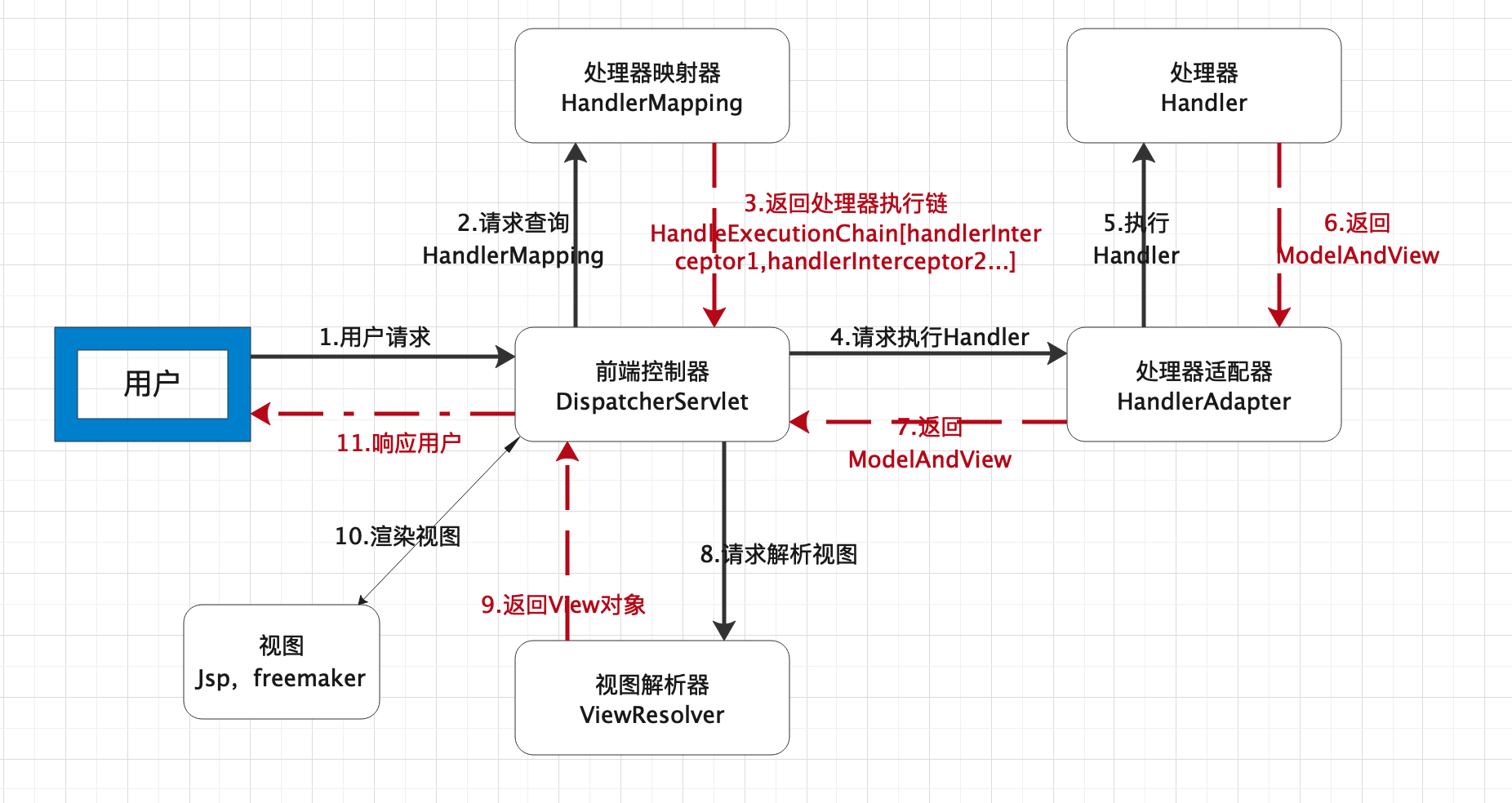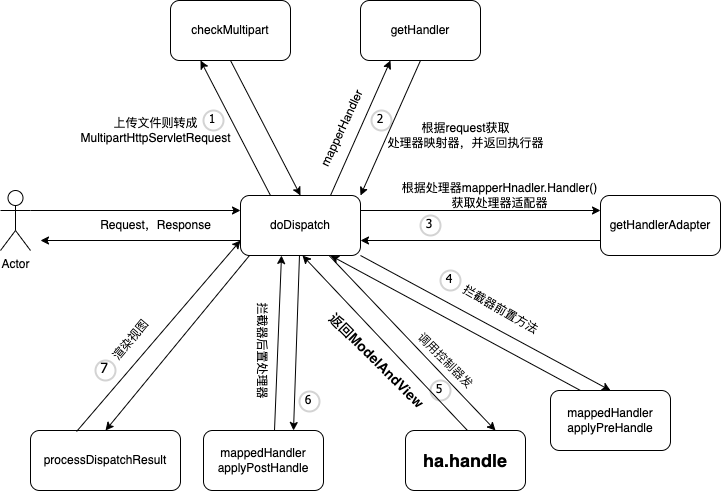我是靠谱客的博主 柔弱抽屉,这篇文章主要介绍SpringMvc源码分析-DispatchServlet处理流程一、springmvc经典处理流程图 二、doDispatch方法三、总结,现在分享给大家,希望可以做个参考。
一、springmvc经典处理流程图
从网上找到了经典流程图,通过流程图来看,整个流程还是比较清晰的

具体方法处理流程图:
 二、doDispatch方法
二、doDispatch方法
该方法是核心处理方法,里面主要做如下处理:

@SuppressWarnings("deprecation")
protected void doDispatch(HttpServletRequest request, HttpServletResponse response) throws Exception {
HttpServletRequest processedRequest = request;
HandlerExecutionChain mappedHandler = null;
boolean multipartRequestParsed = false;
WebAsyncManager asyncManager = WebAsyncUtils.getAsyncManager(request);
try {
ModelAndView mv = null;
Exception dispatchException = null;
try {
processedRequest = checkMultipart(request); //检查是否为multipart请求
multipartRequestParsed = (processedRequest != request);
// Determine handler for the current request. 获取处理器映射器
mappedHandler = getHandler(processedRequest);
if (mappedHandler == null) {//没有找到映射器处理器 则报404 not found
noHandlerFound(processedRequest, response);
return;
}
// Determine handler adapter for the current request. 获取处理器适配器 通常是RequestMappingHandlerAdapter
HandlerAdapter ha = getHandlerAdapter(mappedHandler.getHandler());
// Process last-modified header, if supported by the handler.
String method = request.getMethod();
boolean isGet = HttpMethod.GET.matches(method);
if (isGet || HttpMethod.HEAD.matches(method)) { //判断是否为GET、HEAD请求
long lastModified = ha.getLastModified(request, mappedHandler.getHandler());
if (new ServletWebRequest(request, response).checkNotModified(lastModified) && isGet) {
return;
}
}
//拦截器中preHandle方法
if (!mappedHandler.applyPreHandle(processedRequest, response)) {
return;
}
// Actually invoke the handler.
// 处理器适配器 执行真正处理方法,在内部创建ModelAndView对象
// 可能调用到AbstractHandlerMethodAdapter中的handle方法
mv = ha.handle(processedRequest, response, mappedHandler.getHandler());
if (asyncManager.isConcurrentHandlingStarted()) {
return;
}
applyDefaultViewName(processedRequest, mv);//设置ModelAndView中视图名称
mappedHandler.applyPostHandle(processedRequest, response, mv);//拦截器中postHandle方法
}
catch (Exception ex) {
dispatchException = ex;
}
catch (Throwable err) {
// As of 4.3, we're processing Errors thrown from handler methods as well,
// making them available for @ExceptionHandler methods and other scenarios.
dispatchException = new NestedServletException("Handler dispatch failed", err);
}
processDispatchResult(processedRequest, response, mappedHandler, mv, dispatchException); //渲染视图
}
catch (Exception ex) {
triggerAfterCompletion(processedRequest, response, mappedHandler, ex);
}
catch (Throwable err) {
triggerAfterCompletion(processedRequest, response, mappedHandler,
new NestedServletException("Handler processing failed", err));
}
finally {
if (asyncManager.isConcurrentHandlingStarted()) {
// Instead of postHandle and afterCompletion
if (mappedHandler != null) {
mappedHandler.applyAfterConcurrentHandlingStarted(processedRequest, response);
}
}
else {
// Clean up any resources used by a multipart request.
if (multipartRequestParsed) {
cleanupMultipart(processedRequest);
}
}
}
}三、总结
处理流程比较清晰,下一篇介绍《SpringMvc源码分析-处理器映射器》
最后
以上就是柔弱抽屉最近收集整理的关于SpringMvc源码分析-DispatchServlet处理流程一、springmvc经典处理流程图 二、doDispatch方法三、总结的全部内容,更多相关SpringMvc源码分析-DispatchServlet处理流程一、springmvc经典处理流程图 二、doDispatch方法三、总结内容请搜索靠谱客的其他文章。
本图文内容来源于网友提供,作为学习参考使用,或来自网络收集整理,版权属于原作者所有。








发表评论 取消回复